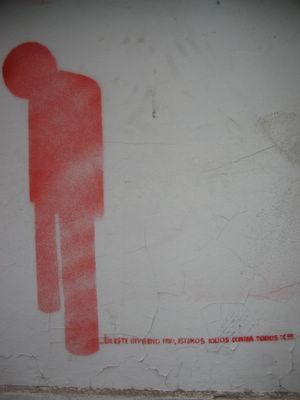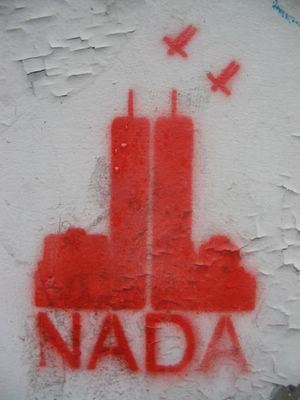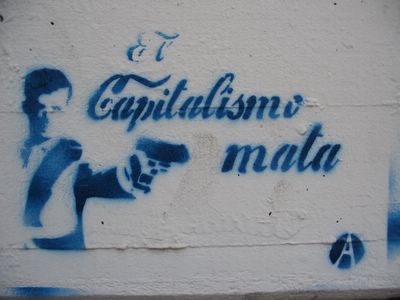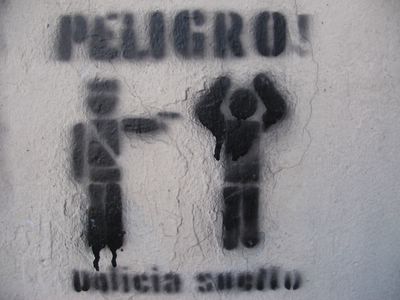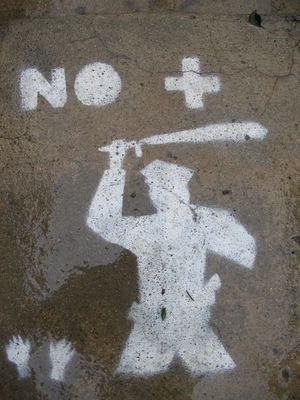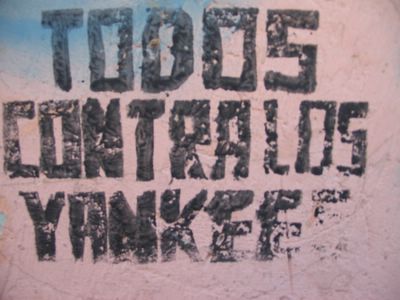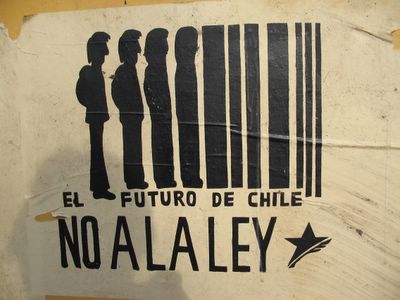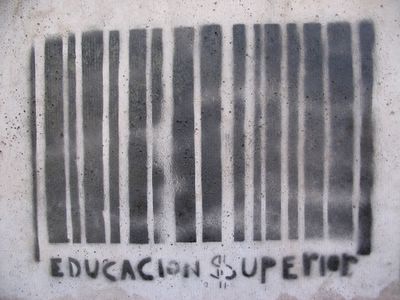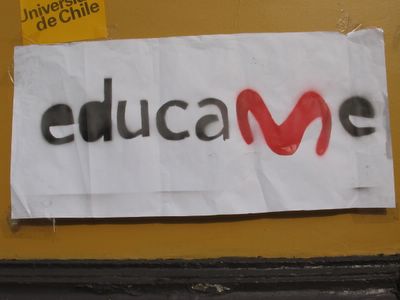A Plan of Action
It was talking to Dewey and his two friends that I realized that the radicalism growing in the religious right of America that I, and they, so much fear is not without its equaling force on the left. Some of the people I met this past weekend were as, if not more, radical than the loonies banging bibles against their tear-covered faces in evangelical mass, the difference is that the lefties target their radical hatred against those in power rather than some socio-cultural other. Both are manifestations of a feeling of ones comfort being threatened. The right is allying with those they see as more economically powerful to protect them from invasion by the "other." While the left is uniting with those fighting the powers that be to protect the comfort they find in being a free-spirited individual, able to do as they please. I always ally myself with the left however, as I witnessed this past weekend, what a large number of these left radicals dedicate their freedom and liberty to is drugs, and occasionally music.
The beauty of radicalism is that is shows people cares. It shows that complacency is passé and people are again willing to stand up for what they believe in. The rise in radicalism also shows that for one reason or another, this growing desire is not being met with a growing capacity of the society at large to funnel it towards constructive use. There are many causes, including, from my point of view: a lack of good public education, a growing feeling of powerlessness, and a growing access to information.
The lack of good public education is the most important from my point of view. The radicals on both sides are generally not coming from well-educated or wealthy backgrounds. These are the people who feel disenfranchised from the system. They are the ones whose chance at feeling a desire to learn and contribute to society was oftentimes hurt at a young age by a broken home, a lack of education, and often compounded by poverty. If children are not taught to learn and to appreciate learning as an act whose doing is not justified by some airy goal or end, but by the action itself, they will most likely never learn to dedicate themselves to any intellectual pursuit. A lack of childhood education oftentimes cannot be remedied later on in life. The brain and its patterns are in a large part trained by childhood actions and habits. If one's childhood doesn't include intellectual stimulus, reading, constructive games, social interactions, etc. the child in question will have a damn hard time dedicating themselves to an ideal so lofty and esoteric and politics. A much more likely pursuit will be survival and basic creature comfort.
The three root causes of radicalism are all intertwined and any combination of them can lead to similar results. The sense of powerlessness comes in part from a lack of education and a life of poverty. A very important factor, that I believe is becoming more and more important as America continues down the path we are on is that of income distribution. People are much more likely to feel united behind a cause or ideal if they see that cause or ideal representing them and being represented by them as equally as their neighbor. Thus democracy is based a platform of egalitarian principles. When the income gap between the rich and poor begins to grow, and this income gap proves to be self-perpetuating, increasing with each generation as nepotism and favors trump the idealized meritocracy of "The American Dream", which incidentally never existed. As this gap grows, those who are increasingly obviously left out of the upper-echelons will become increasing discontent and begin to do something about their anger at some point. This point will be by my reckoning some point in the near future.
The increased access to information. The internet has changed everything. Now a coal miner in the Pocono Mountains no longer has to accept to his lot in life and tell his son that he damn well better do the same. That same miner can now go online and see that other miners around the country have organized, unionized and mobilized and because of this are now receiving higher pay, better conditions and shorter hours. Whereas before the internet this presumably uneducated man would have to keep toiling away just to bread on the table day after day, he now has options as a result of his increased access to information. He now has the choice to inform others and organize those around him, or to go to where the better employment is. Knowledge is power, but there is no moral filter on this knowledge. That is to say, just by informing the masses our world is not going to improve. Not all information is good, and that information that tends to draw the most attention and be the most influential is that which is most corrupt or harmful. Either way, the access to information changes everything. It allows even the most geographically isolated to take center stage in online debates about what is happening halfway around the world. It allows an inner-city kid with no money for books to read great poetry and discover her love of writing. The examples are endless, as are the possibilities when the masses start getting informed.
Dewey helped me to realize this. He is one of the warmer, more giving, and interested individuals I've met recently. He was content to sit down and listen to people talk for hours just to learn what they had to say. He was a victim of a broken home, a bad public education and is now experiencing an increased access to information. He told me that is why he loves festivals; they are diverse gatherings of people and music from around the country that come together to share thoughts, songs, ideas, drugs, food and love. The drug scene is out of control, but there will always be the minority of people in any group who take what they do to an unhealthy extreme (see opening paragraphs for reasons why). One time after Dewey and I had been talking for hours he stopped mid-sentence and said,
"That's it. I need a plan! We're all so angry about this fucked-up government and our fucked-up world but no one has a plan. Of course! All I need to start is a plan."
It seemed obvious, but no. Up until that point he had been content just being angry about the situation. He saw his role in the scheme of things to be effective only to a certain point and being angry was good enough. Why try to make a change in something you can't even touch? Dewey told me what a huge breakthrough this was. He had a simultaneous realization that money is the root of all evil, and this was to form the basis for his plan, last time we spoke. Just by talking - by offering him another perspective on things he was already thinking about - he was able to realize more of his own potential within the system he feels so distant from. By increasing his access to "good" information he was able to step back from a sword-waving blind brand of anger, to a more constructive brand of anger, focused towards changing the system. The information is out there, the problem in the days ahead will be figuring out how to assure that information meant to inform, and not to influence, is distributed equally and fully among the population, especially the children.
Read more
